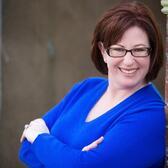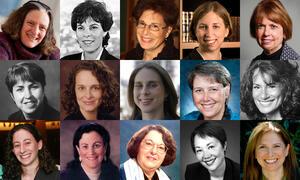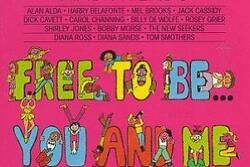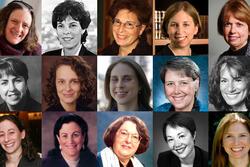Finding My Way Back to Rachel Adler
Courtesy of The Forward.
In the video clip, "Setting History Straight," Dr. Rachel Adler articulates the need for ongoing discussion and academic exploration of the historical and contemporary roles of women in Judaism.
According to her, the presence of women rabbis and the emergence of women scholars is responsible for the recovery of a lot of Jewish women's history, most of which had been suppressed. Without a close examination of women's journey to ordination and the ongoing struggle to gain acceptance in the wider Jewish community, it is a safe assumption that future generations will have no sense of the efforts required to secure women’s place in our shared narrative. She’s right.
I didn’t always feel this way. In fact, for most of my life, I rejected the notion that I was a feminist. I was a self-decribed equalist. I did not want to be associated with anything resembling the bra-burning, Lilith-reading farbrente feminists I had learned about in school. In 1995, during my second year of rabbinical school at the Hebrew Union College-Jewish Institute of Religion, a prominent woman rabbi came to speak to our Practical Rabbinics class. She was from the first generation of women rabbis and had grown up in the Conservative Movement. She had experienced a great deal of gender bias both personally and professionally and she talked about the institutional misogyny that existed in Judaism and how women had been kept out of the story by patriarchal leadership dating back to Talmudic times. She spoke of her own sense of alienation from our ancient texts and tradition. I heard the words, but, as a young rabbinical student, they were foreign to me. I hadn’t known anything close to the blatant sexism she had experienced.
I had grown up in a synagogue that embraced egalitarianism even before it became a watchword of the Reform movement. In 1983, just ahead of being called to Torah as a bat mitzvah, I asked my parents about wearing a tallit, which was not the custom at the time. Our shul’s liturgy included the matriarchs, and women were granted the same access to Torah, learning, and every other aspect of communal Jewish life as the men.
As the visiting rabbi continued to rail against the patriarchy, my agitation grew until I burst out that my experience had been very different, and I didn’t relate at all to her experience. She informed me that I was suffering from so much trauma that I had clearly blocked out my own pain and sense of disenfranchisement. I wondered aloud if forgotten marginalization still counted and the answer, from the rabbi, was a resounding yes. It was not an easy conversation.
It was with this bias that I had begun my rabbinic studies. Sure, I owned a copy of Judith Plaskow's Standing Again at Sinai, the prototypical feminist exploration of women in Judaism. But a recent peek between its covers revealed a lack of marginalia–– a sure sign that I had never actually read it. Ellen Umansky's chapter on “Jewish Feminist Theology in Choices” in my copy of Modern Jewish Thought, is rife with argumentative and reactive comments from a younger version of myself.
I came across the name of Rachel Adler around the same time that woman rabbi came to visit our class, but I didn't really “get” her. I found the title of her groundbreaking essay, "The Jew Who Wasn't There: Halacha and the Jewish Woman," off-putting. In this essay, Adler articulated the lack of a women’s independent spiritual life and referred to the Jewish woman as a "peripheral Jew." I couldn’t relate because her description could not have been further from my experience.
Instead of delving deeper into feminist theory and attempting to reconcile Adler's theology with mine, it repelled me and I did not seek to understand or acknowledge a narrative that differed so radically from mine.
More than two decades have passed since I first "met" Rachel Adler. And two recent flashpoints have brought me back to her.
The first was the work I did as editor of an anthology called The Sacred Calling: Four Decades of Women in the Rabbinate. For four years, I was immersed in a book project whose subject matter forced me to confront my own detached relationship with Jewish feminism. The early chapters in my book took me beyond the contemporary issues faced by women in the rabbinate. It became clear that women's desire to serve in a rabbinic capacity extended back centuries. Names of women who had asserted their agency to lead the People Israel had been unknown to me. Their yearning to respond to a sacred calling was not unlike my own. But the repercussions they faced made my journey seem simple. The more I read, the more I began to understand that the years of my resistance to feminism had caused a disassociation between me and my rabbinic foremothers. Any misgivings I once had were replaced with a newly-awakened sense of connection with these women and their stories and a strong desire to find my place in a narrative that once seemed detached from my personal experience.
The second experience has been the #MeToo phenomenon. Women’s recent willingness to share their experiences of their suppression, harassment, and assault by men in positions of power has led to nonstop conversations among my female colleagues about the aggressions, both macro and micro, we women rabbis face on an ongoing basis. The constant barrage of revelations has unearthed long forgotten incidents and experiences of my own, unexpectedly threatening to topple my status quo.
Every woman rabbi has stories. In a recent article that appeared in The Jewish Week, Rabbi Hara Person, Chief Strategy Officer of the Central Conference of American Rabbis, is quoted as saying that sexual harassment “is so pervasive I can’t give you a number.” Because of the way that girls and women are socialized in our country, I internalized many of my own experiences as part of being female rather than being a documentable offense. These offenses came in many forms: inappropriate gifts and messages from supervisors, crude jokes at my expense during religious rituals I was facilitating, or the threat of physical violence from the father of one of my students. At no point did it occur to me that I should report these experiences. Even though each one made me extremely uncomfortable.
Until our national conversation turned to the blatant sexual harassment that is inherent in our society, I had concocted all types of reasons to explain away what were clearly acts of aggression. The juxtaposition of these flashpoints, of engaging with the history of women rabbis and the #MeToo movement, sparked my “click moment.” An expression dating back to the feminist movements of the 1970s, a click moment is when one's perspective shifts suddenly, challenging and changing one's worldview. Rather than growth, which is a gradual process, a click moment is a radical and rapid movement. And it can be unsettling.
This shift has inspired me to revisit Adler's work. I now approach our tradition with a bit of caution and distance, and regard the barriers inherent in traditional Judaism that have continued to restrain women from attaining the goal of religious equality with a much more jaded perspective. I am no longer able to look at our sacred text without wondering what stories and which voices were not included simply because they belonged to women.
In my youth, rather than confront the misunderstandings about feminism, I allowed my sophomoric disdain to define how I perceived the world around me, disregarding the wisdom and experiences of those who came before me. I regret my juvenile pretentiousness, and am attempting to make up for lost time by devouring copious amounts of books and articles on the intersection of Judaism and feminism. Peripheral Jew no longer, I am an emerging feminist.








Thank you for continuing to be an incredible teacher and voice. Nice work!